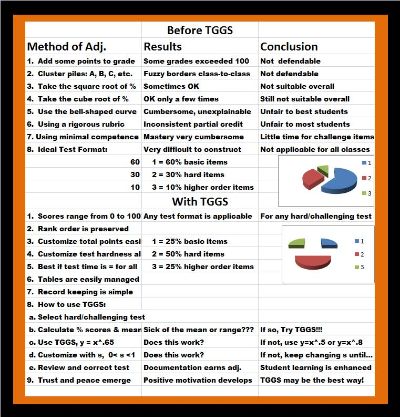Why use The Great Grading Scale?
Why The Great Grading Scale (TGGS)?
In the classroom, teachers want to teach more and they expect students to learn more. In order for this to occur, challenging tests must be given. Constructing a well-balanced test can be a difficult task and extremely time-consuming. I believe that it may be in the favor of the students to take the tests that accompany the adopted textbooks or tests which are departmentally developed and maintained. By using The Great Grading Scale, test scores may be adjusted fairly, defended, and explained. Students will be treated justly, graded consistently, and may be remediated accordingly. In addition, the overall expectations of the school and community may be met in a positive and favorable way. The result: “Love/mercy” is given; “Trust” emerges; “Peace” hovers; and everyone wins. Perhaps, the greatest benefit from a hard and challenging test surfaces whenever the test is reviewed and corrected; that is, student improvement acquired after the test validates that each TGGS adjustment is earned.

So, Why not??
If you never give challenging tests; if you never give unit, mid-term, semester, or yearly tests; if you never give higher-order thinking tests; if you never give tests that have time constraints; if you never have difficulty in writing tests that are well-balanced and yield fair, valid, and consistent results; if you never have to adjust(modify) any scores; if you never have to make allowances for typing/writing discrepancies; if you never grapple with how much to give for partial credit; or if you never have a need to provide meaningful feedback or re-teaching for the content tested; …then you don’t need the great grading scale.
Acknowledgements for Inspiration shared with me:
My children, Christy and David
Mrs. Louise M. Traylor, Elementary, 5th & 6th grade teacher; HM: P Vinson, M Woodruff, R Glazner, A Peoples, M Browning.
Mr. Howard L. Brewer, High School, math teacher; HM: J White, F Hackney, L McMinn, A & LC Williams, S Whitley, I Young.
Mr. Newbern W. Bush, JSU, math teacher
Dr. Len Pikkart, UGA, graduate advisor
Dr. James W. Wilson, UGA, graduate advisor and mentor
Dr. John P. Downes, GSU, dissertation chairman, advisor, and mentor
Dr. William Curlette and Dr. Joe Walker, GSU, dissertation committee
Dr. Robert Young, long-time friend, co-worker, and personal consultant; HM: S McCain, L Mitchell, C Vinson, R Layfield, S Rogers, E Battle, D Pitre.
EF/NM Alexander, parents, & A L Winn, grandmother, who taught me “Only one life, it soon will be past; only what’s done for Christ will last.” Anon.
From my Heart, I sincerely appreciate and cherish your guidance & care.